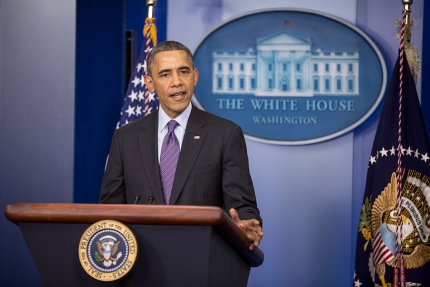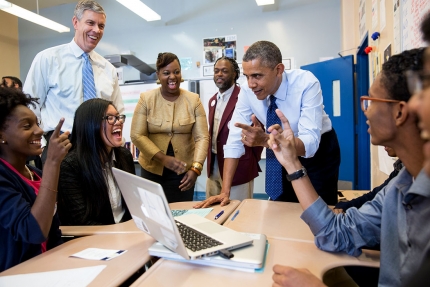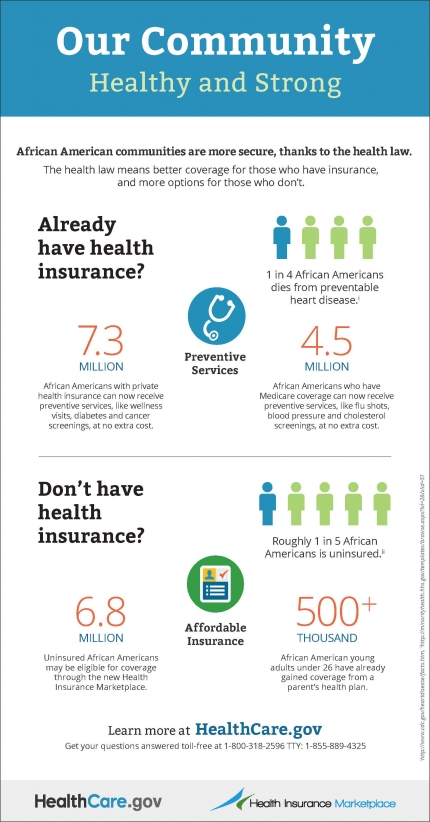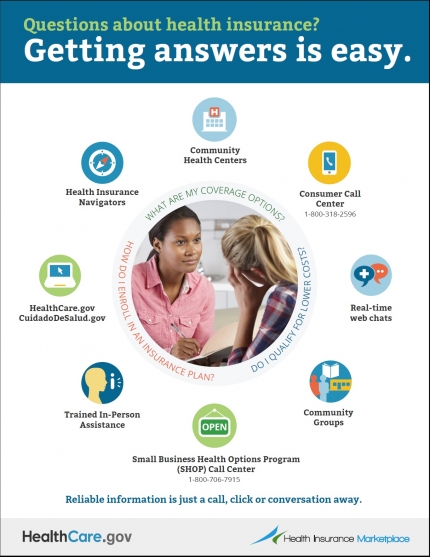Blog Posts Related to the African American Community
Remembering Nelson Mandela
Posted by on December 10, 2013 at 6:30 PM ESTToday in Johannesburg, President Obama joined leaders from the United States and around the world at a national memorial service for former South African President Nelson Mandela.
In President Obama’s remarks, he reflected on what Mandela meant to him personally, as well as to the people of South Africa, and urged all of us to remember Madiba’s legacy and contributions to humanity.
For the people of South Africa, for those he inspired around the globe, Madiba’s passing is rightly a time of mourning, and a time to celebrate a heroic life. But I believe it should also prompt in each of us a time for self-reflection. With honesty, regardless of our station or our circumstance, we must ask: How well have I applied his lessons in my own life? It’s a question I ask myself, as a man and as a President.
Learn more aboutPresident Obama Delivers a Statement on the Passing of Nelson Mandela
Posted by on December 5, 2013 at 6:10 PM ESTThis afternoon, from the White House Briefing Room, President Obama delivered a statement on the passing of former South African President and anti-apartheid leader Nelson Mandela, calling him "a man who took history in his hands, and bent the arc of the moral universe toward justice."
"We will not likely see the likes of Nelson Mandela again," the President said. "So it falls to us as best we can to forward the example that he set: to make decisions guided not by hate, but by love; to never discount the difference that one person can make; to strive for a future that is worthy of his sacrifice."
Read the President's full remarks here.
Learn more aboutPresident Obama Supports High School Redesign to Ensure Educational Excellence
Posted by on November 18, 2013 at 11:36 AM ESTTo highlight his High School Redesign initiative, President Obama recently visited and spoke at Pathways in Technology Early College High School (P-TECH) in Brooklyn, New York. P-TECH is one of several new transformative high school designs that incorporate innovative approaches to curriculum that help lead to higher academic outcomes, greater student engagement, and future student success. The proposed $300 million High School Redesign program would integrate challenging and relevant academic and career-related learning experiences that prepare students for post-secondary education and careers.
P-TECH, a middle and high school, was established in 2011 as a partnership between IBM, the New York City Department of Education, and the City University of New York's College of Technology. In 2017, the school will graduate its first class of students who, over six years of STEM study and training, earn a joint high school diploma and associate's degree in computer information systems and electromechanical engineering technology. P-TECH's rigorous course of academic study was co-designed with IBM. The company has also invested $500,000 to provide software support, mentors, and internship opportunities for every P-TECH student.
Learn more about , , Education, TechnologyHow The Affordable Care Act Will Benefit African Americans
Posted by on September 26, 2013 at 11:21 AM ESTThe Affordable Care Act –will help make health insurance coverage more affordable and accessible for millions of Americans. For African Americans, like other racial and ethnic minorities, the law will address inequities and will increase access to quality, affordable health coverage, invest in prevention and wellness, and give individuals and families more control over their care.
African Americans suffer from obesity, heart disease, and diabetes at higher levels than the general population. For example, in 2010, 37 percent of African Americans were obese, compared to 26% of whites1. Expanding opportunities for coverage can improve health outcomes for African Americans.
Already, the Affordable Care Act has benefitted the nearly 85% of Americans who already have insurance:
- 3.1 million young adults have gained coverage through the parents’ plans
- 6.6 million seniors are paying less for prescription drugs
- 105 million Americans are paying less for preventative care & no longer face lifetime coverage limits
- 13.1 million Americans have received rebates from insurance companies
- 17 million children with pre-existing conditions no longer denied coverage or charged extra
Beginning in 2014, the Affordable Care Act will provide 6.8 million uninsured African Americans an opportunity to get affordable health insurance coverage. The following provides an overview of the coverage and benefits available to African Americans today and those made possible by the Health Insurance Marketplace.
Happening Now:
- An estimated 7.3 million African Americans with private insurance now have access to expanded preventive services with no cost sharing. These services include well-child visits, blood pressure and cholesterol screenings, Pap tests and mammograms for women, and flu shots for children and adults.
- The 4.5 million elderly and disabled African Americans who receive health coverage from Medicare also have access to many preventive services with no cost-sharing, including annual wellness visits with personalized prevention plans, diabetes and colorectal cancer screening, bone mass measurement and mammograms.
- More than 500,000 young African American adults between ages 19 and 25 who would otherwise have been uninsured now have coverage under their parent’s employer-sponsored or individually purchased health plan.
- Major federal investments to improve quality of care are improving management of chronic diseases more prevalent among African Americans.
- The health care workforce will be more diverse due to a near tripling of the National Health Service Corps. African American physicians make up about 17 percent of Corps physicians, a percentage that greatly exceeds their 6 percent share of the national physician workforce.
- Investments in data collection and research will help us better understand the causes of health care disparities and develop effective programs to eliminate them.
- Targeted interventions, such as Community Transformation Grants, will promote healthy lifestyles, lower health care costs, and reduce health disparities.
- Increased funding available to more than 1,100 community health centers will increase the number of patients served. One of every five patients at a health center is African American.
Coming Soon:
- 6.8 million uninsured African Americans will have new opportunities for coverage through the Health Insurance Marketplace. Of the 6.8 million uninsured African Americans who are eligible for coverage through the Marketplace, 56 percent are men.
- The Marketplace is a destination where consumers can compare insurance options in simple, easy to understand language. At the Marketplace, consumers will be able to compare insurance options based on price, benefits, quality and other factors with a clear picture of premiums and cost-sharing amounts to help them choose the insurance that best fits their needs.
- Consumers may be eligible for free or low cost coverage, or advance premium tax credits that lower monthly premiums right away. Individuals with higher incomes (up to 400 percent of the federal poverty level, or $94,200 for a family of four) will be eligible to purchase subsidized coverage from the Health Insurance Marketplace.
- States have new opportunities to expand Medicaid coverage to include Americans with family incomes at or below 133 percent of the federal poverty level (generally $31,322 for a family of four in 2013). This expansion includes adults without dependent children living at home, who have not previously been eligible in most states.
New Report from the U.S. Department of Health and Human Services (HHS) on lower than expected premiums available in the new Health Insurance Marketplace:
A new report released today by the Department of Health and Human Services (HHS) finds that in state after state, consumers will see increased competition in the Health Insurance Marketplace, leading to new and affordable choices for consumers. According to the report, consumers will be able to choose from an average of 53 health plans in the Marketplace, and the vast majority of consumers will have a choice of at least two different health insurance companies - usually more. Premiums nationwide will also be around 16 percent lower than originally expected – with about 95 percent of eligible uninsured live in states with lower than expected premiums – before taking into account financial assistance.
To read the report on health insurance rates, visit: http://aspe.hhs.gov/health/reports/2013/MarketplacePremiums/ib_marketplace_premiums.cfm.
To view the data on rates, visit: http://aspe.hhs.gov/health/reports/2013/MarketplacePremiums/datasheet_home.cfm.Getting answers is easy:
Visit HERE for helpful resources to get more information on the Affordable Care Act and the Health Insurance Marketplace.
_____________________
1 http://www.cdc.gov/nchs/data/series/sr_10/sr10_252.pdf
President Obama Names New Leadership to the White House Initiative on Historically Black Colleges and Universities
Posted by on September 12, 2013 at 2:55 PM ESTIt is an exciting day at the White House, and across the country, as President Obama names two dynamic new leaders to head the White House Initiative on Historically Black Colleges and Universities (HBCUs). Dr. George Cooper will begin this week as the Initiative’s Executive Director, and Dr. Ivory Toldson will serve as Deputy Director.
The task at hand for Dr. Cooper and Dr. Toldson is to lead a team, stretched across 32 federal agencies, corporate entities, and philanthropic organizations, to work together in strengthening the capacity of over 100 HBCUs, as they strive to shape this country’s next generation of leaders.
Learn more about , , EducationU.S. Mint-Produced Congressional Gold Medal Posthumously Awarded to the Victims of the 16th Street Baptist Church Bombing
Posted by on September 11, 2013 at 2:29 PM ESTRead this blog post on Treasury's website HERE
Watch: video of POTUS signing a bill in the Oval Office designating the Congressional Gold Medal to commemorate the lives of four young girls who were killed in Birmingham, Alabama at the 16th Street Baptist Church bombing of 1963. https://www.youtube.com/watch?v=GtiQfXDiS4M
9/10/2013
September 15, 2013 will mark the 50th anniversary of the tragic deaths of Addie Mae Collins, Denise McNair, Carole Robertson, and Cynthia Wesley in Birmingham, Alabama. The four girls, aged 11-14, were entering a Sunday school class when a planted bomb exploded at the city’s historically African American 16th Street Baptist Church. This act of racially-motivated violence galvanized the Civil Rights Movement and sparked a surge of momentum that helped secure the passage of the Civil Rights Act of 1964.
To commemorate their lives, U.S. Representative Terri Sewell introduced H.R. 360 to posthumously award Addie Mae, Denise, Carole and Cynthia with the Congressional Gold Medal, which along with the Presidential Medal of Freedom, is considered one of the highest civilian honors bestowed in the United States. The bill required the Secretary of the Treasury – and by extension, the United States Mint – to strike the gold medal, as well as bronze duplicates. After the bill passed the House 420-0 and, under the leadership of U.S. Senator Richard Shelby, passed the Senate by unanimous consent this spring, President Obama signed the bill into law on May 24, 2013.
Today, with family members of the “four little girls” and civil rights leaders from across the country looking on, House Speaker John Boehner awarded the medal, entrusting it to the Birmingham Civil Rights Institute in Birmingham, AL, where it will be displayed. Treasury is humbled by the opportunity to play a role in honoring Addie Mae, Denise, Carole and Cynthia and their impact on American history.
To learn more about the events of September 15, 1963, please visit here. Bronze duplicates of the medal will be available for purchase starting tomorrow at 12pm EDT here.
Read a related blog post by Valerie Jarrett HERE.
Rosie Rios is the Treasurer of the United States.
Learn more about Civil Rights
- &lsaquo previous
- …
- 7
- 8
- 9
- 10
- 11
- 12
- 13
- 14
- 15
- …
- next &rsaquo




